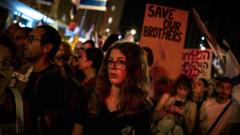Will Petrol Queues in Malawi Drown Out the Lines to Vote?

Published: 2025-09-14 00:10:41 | Category: world
As Malawi approaches its general election, many citizens find themselves prioritising fuel over voting, amid a backdrop of severe petrol shortages, economic hardship, and rising living costs. The presidential race features an array of candidates, yet voter enthusiasm is dampened by a pervasive sense of cynicism about the potential for change.
Last updated: 26 October 2023 (BST)
Key Takeaways
- Malawi faces severe fuel shortages, impacting public sentiment ahead of elections.
- Economic challenges include rising inflation, a lack of job opportunities, and increasing food prices.
- Younger voters, who make up a significant portion of the electorate, are disillusioned by past elections.
- Presidential candidates include incumbent Lazarus Chakwera and former President Peter Mutharika, among others.
- Campaign activities have been muted due to financial constraints and public apathy.
Current Economic Landscape in Malawi
Malawi's citizens are grappling with a series of interconnected crises that have left them frustrated and disillusioned. Prolonged petrol shortages have taken centre stage, with queues for fuel becoming a common sight. As the election approaches, many voters are more concerned about filling their tanks than casting their ballots. This predicament is exacerbated by frequent power cuts, rising living costs, and increasing poverty rates, creating a perfect storm of discontent.
Impact of Economic Challenges on Voting Sentiment
The economic hardships faced by Malawians are tangible. The cost of living has surged, with food prices reportedly rising by over 30% in the past year, while wages have stagnated. With many young people struggling to find employment, the urgency for effective solutions is palpable. According to reports, around half of the registered voters are under 35, a demographic particularly affected by these economic issues. Yet, the leading candidates in the presidential race, Lazarus Chakwera and Peter Mutharika, are considerably older, raising questions about their ability to connect with younger voters.
Election Dynamics and Candidate Profiles
As the election draws near, the political landscape has been shaped by a sense of cynicism and financial constraints. Traditional campaign tactics, such as free promotional items and large billboard advertisements, have diminished significantly. This muted electioneering reflects the reality that many Malawians are focused on survival rather than electoral fervour.
Presidential Candidates Overview
The election features a crowded field of candidates, including incumbent President Lazarus Chakwera, who has faced criticism during his tenure, and former President Peter Mutharika, who is seeking to reclaim the presidency. Additionally, former President Joyce Banda, the only woman to have held the office, is running again, promising to address corruption and economic reform.
Other candidates, such as Atupele Muluzi, Dalitso Kabambe, and Vice-President Michael Usi, also put forward their visions for change. Despite the diversity of candidates, the overarching question remains: can any of them effectively address the pressing issues facing the nation?
Public Sentiment and Voter Disillusionment
Interviews with younger voters reveal a profound disillusionment with the electoral process. Many express frustration over the lack of meaningful change following previous elections. Ashley Phiri, a 35-year-old voter, articulated this sentiment, stating, "We've been voting and voting but things haven't gotten better." This disillusionment is compounded by the stark realities of daily life, where basic necessities like fuel and food become increasingly difficult to obtain.
Key Issues Influencing Voter Choices
As citizens consider their options, several key issues weigh heavily on their minds:
- Fuel Shortages: The ongoing fuel crisis has become emblematic of broader governance issues, prompting voters to question the candidates' capabilities.
- Food Security: With 80% of the population reliant on agriculture, the rising costs of essential inputs like fertiliser are critical concerns.
- Job Creation: Unemployment among youth is a pressing issue that candidates need to address to gain support.
- Corruption: Many voters are wary of corruption in government, prompting calls for transparency and accountability.
Government Responses and Promises
In response to these challenges, President Chakwera has acknowledged the frustrations of Malawians, particularly concerning fuel shortages. He has publicly accused corrupt officials of sabotaging the oil market and pledged to combat these issues. His administration's plan to deposit 500,000 Malawi kwacha (£210) for each child born after the election is aimed at fostering future economic stability, though many remain sceptical about its feasibility.
Comparative Analysis of Candidates' Proposals
While all candidates promise radical change, the feasibility of their proposals is under scrutiny. The promises include:
- Chakwera's pledge to reduce fertiliser prices and invest in future generations.
- Mutharika's focus on returning to policies believed to have previously benefitted the economy.
- Banda's commitment to fighting corruption and improving infrastructure.
However, many voters are sceptical about whether these promises can translate into tangible improvements in their daily lives.
What Lies Ahead for Malawi?
As the election approaches, the question remains: can any of the candidates offer a credible solution to the myriad problems facing the nation? With voter apathy at an all-time high, the ability of the next president to inspire confidence and hope will be crucial in determining their success. Addressing economic issues will be paramount, particularly in light of the rising cost of living and persistent fuel shortages.
Conclusion
The upcoming general election in Malawi is not just a contest for political power; it is a critical juncture for the nation's future. With pressing issues like economic hardship, unemployment, and food security dominating the landscape, voters are looking for a leader who can bring about real change. As the nation prepares to cast its votes, the hope is that whoever emerges victorious will prioritise the welfare of the people and work towards a more prosperous Malawi.
FAQs
What are the major issues facing Malawi ahead of the elections?
Major issues include fuel shortages, rising food prices, high unemployment, and pervasive corruption, which have contributed to public disillusionment with the electoral process.
Who are the main presidential candidates in Malawi's upcoming election?
The main candidates include incumbent President Lazarus Chakwera, former President Peter Mutharika, and Joyce Banda, along with several others promising change.
How has voter sentiment changed in Malawi leading up to the elections?
Voter sentiment has shifted towards cynicism and disillusionment, particularly among younger voters who feel that previous elections have not resulted in meaningful improvements in their lives.
What are the economic challenges faced by Malawians?
Economic challenges include high inflation, food insecurity, and a lack of job opportunities, exacerbated by rising living costs and stagnant wages.
What promises have the candidates made regarding economic reforms?
Candidates have promised to address corruption, reduce the cost of essential agricultural inputs like fertiliser, and create job opportunities for the youth.



